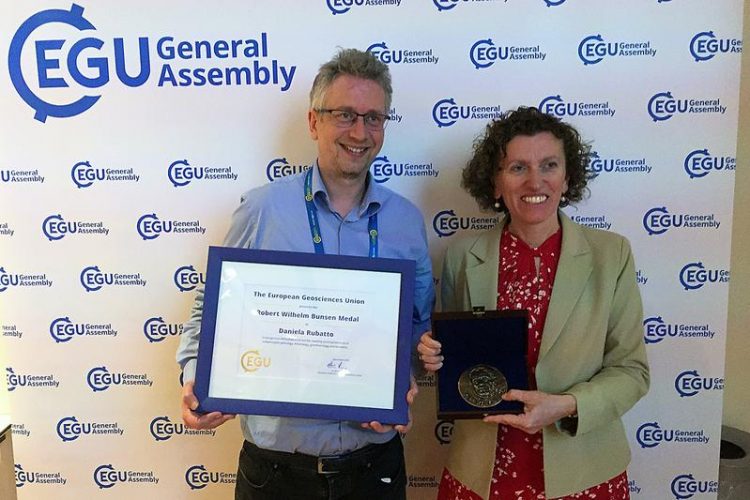"Flight recorder" of rocks within the Earth’s crust

Prof. Dr. Daniela Rubatto and Mike Burton, president of the Division of Geochemistry, Mineralogy, Petrology & Volcanology of the European Geosciences Union. Courtesy of Daniela Rubatto
Daniela Rubatto received the prestigious Robert Wilhelm Bunsen Medal of the European Geosciences Union (EGU) on April 9, 2019. The award singles out Daniela Rubatto’s innovative research on the trace element contents of the mineral zircon and associated rock-forming minerals. This research has provided a new way to connect ages of minerals to the conditions at which the minerals formed.
A “flight recorder” of geological processes
Daniela Rubatto's innovative method makes it possible to extract valuable information from minerals. This data allows reconstructing the speed and duration of travel of rock masses within the Earth, similarly to a flight recorder that documents the time and place of a moving airplane.
Rubatto obtained these results by careful analysis of individual mineral zones with an ion microprobe, an advanced instrumentation that allows obtaining the isotopic composition of minerals from a very small volume.
This approach provides a new and rigorous way to constrain the duration and rate of metamorphic processes in rocks and represents a significant advance in metamorphic petrology; it contributes to the better understanding and quantification of the dynamics of geological processes over wide temporal and spatial scales.
Multiple international recognition
The Bunsen Medal was awarded during the EGU General Assembly from April 7-12, 2019 in Vienna. It is only the second time that the Robert Wilhelm Bunsen Medal is awarded to a female researcher. “It is a great honour for me to receive the Robert Wilhelm Bunsen Medal. Moreover, it is a confirmation that all the efforts the students, collaborators and I invested, helped to advance the field of geology – for the benefit of science and society,” says Rubatto.
“The University of Bern has an excellent combination of expertise in solid earth geochemistry, ranging from field-work to modelling, together with advanced instruments necessary for my research,” says Rubatto.
The Robert Wilhelm Bunsen Medal represents an additional award in Daniela Rubatto's career: She has already received several prizes and honors, including the ETH Medal for an outstanding PhD thesis, the J G Russel Award and the Dorothy Hill Medal of the Australian Academy of Sciences.
Catching traces of fluids in minerals
Daniela Rubatto is currently investigating the interaction between fluids, mainly water, and minerals in the deepest part of the Earth's crust. These fluids facilitate some of the most important geological processes, from plate tectonic to volcanism, and are responsible for significant mass and heat transfer in our planet. These fluids are difficult to catch because they move rapidly and are not commonly retained in rocks. “I am currently developing analytical methods to reveal the geochemical traces of these fluids in minerals,” says Rubatto. “The Bunsen Medal is a motivation for me and my team to continue to do our best, even when we are facing obstacles or setbacks.
Commitment to promoting young talents
Daniela Rubatto is committed to promoting young researchers. At the Australian National University, for example, she co-founded the Network for Early Career Academics (NECTAR). Since then, this network has grown significantly and is now an established voice of young researchers at ANU. Over the career Daniela Rubatto has supervised eight PhD students and worked with more than 25 others from all over the world. Some current and former PhD students joined Daniela Rubatto at the EGU award ceremony in Vienna.
Prof. Dr. Daniela Rubatto
Institute of Geological Sciences, University of Bern
Phone: +41 31 631 47 70 / +41 78 402 30 72 / daniela.rubatto@geo.unibe.ch
https://www.unibe.ch/news/media_news/media_relations_e/media_releases/2019/medie…
Media Contact
All latest news from the category: Earth Sciences
Earth Sciences (also referred to as Geosciences), which deals with basic issues surrounding our planet, plays a vital role in the area of energy and raw materials supply.
Earth Sciences comprises subjects such as geology, geography, geological informatics, paleontology, mineralogy, petrography, crystallography, geophysics, geodesy, glaciology, cartography, photogrammetry, meteorology and seismology, early-warning systems, earthquake research and polar research.
Newest articles

Trotting robots reveal emergence of animal gait transitions
A four-legged robot trained with machine learning by EPFL researchers has learned to avoid falls by spontaneously switching between walking, trotting, and pronking – a milestone for roboticists as well…

Innovation promises to prevent power pole-top fires
Engineers in Australia have found a new way to make power-pole insulators resistant to fire and electrical sparking, promising to prevent dangerous pole-top fires and reduce blackouts. Pole-top fires pose…

Possible alternative to antibiotics produced by bacteria
Antibacterial substance from staphylococci discovered with new mechanism of action against natural competitors. Many bacteria produce substances to gain an advantage over competitors in their highly competitive natural environment. Researchers…





















